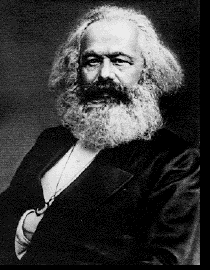Karl Marx
Philospher and revolutionary, b. 5 May 1818 (Trier, Germany), d. 14 March 1883 (London, England).
 Karl Marx was the son of Heinrich Marx, a lawyer in Prussia. His mother Henrietta was from Holland. Both came from Jewish families who had produced rabbis over many generations, but Karl's father had been baptized, most likely to be able to make a career in Prussia. Both parents were active in the movement for a Prussian constitution.
Karl Marx was the son of Heinrich Marx, a lawyer in Prussia. His mother Henrietta was from Holland. Both came from Jewish families who had produced rabbis over many generations, but Karl's father had been baptized, most likely to be able to make a career in Prussia. Both parents were active in the movement for a Prussian constitution.
Marx enrolled at the University of Bonn, Germany in the humanities in 1835 but moved to the University of Berlin a year later to enrol in law and philosophy. In 1841 he received the degree of Doctor of Philosophy from the University of Jena. He began to contribute articles to the Neue Rheinische Zeitung, a new newspaper founded by young industrialists who supported the ideas of liberal democracy. In 1842 he became the paper's editor.
In the following year Marx moved to Paris, where he made the acquaintence of French communists and became a communist himself. Of his new working class friends he said that their ideas were "utterly crude and unintelligent" but that "the brotherhood of man is no mere phrase with them, but a fact of life."
The Prussian government exerted pressure on France, and in 1845 Marx was expelled from Paris and moved to Brussels, Belgium, where he was joined by his life-long friend Friedrich Engels and denounced his Prussian citizenship.
The two friends combined Marx' philosophical education with Engels' experience of the conditions of the English working class to write Die deutsche Ideologie (The German Ideology), the basis of their materialistic analysis of history. It describes how through human history societies are structured to satisfy the interests of the economically dominating, or ruling, class and that all intellectual activity, such as religion and the arts, serve to promote that aim. They finished the manuscript in 1846 but did not find a publisher at the time; the work was published in 1932, half a century after Marx' death.
In 1847 Marx was asked to write a political program for the Communist League, a secret society of working class people in London. He and Engels wrote the Communist Manifesto, which drew on the ideas of the "German Ideology". It described history as a series of class struggles and foreshadows the classless society through victory of the proletariat (working class). Among its immediate demands were progressive income tax, abolition of inheritance and free education.
When revolution broke out in Europe in 1848 Marx and Engels saw it as a bourgeois revolution and insisted that the working class should collaborate with the bourgeoisie and not attempt a proletarian revolution. Marx revived the defunct Neue Rheinische Zeitung and used it for a call to arms and resistance when the king dissolved the Prussian Assembly. Taken before court he argued that the king's action was an unlawful counterrevolution and that armed resistence was thus justified and necessary. He was acquitted unanimously, and the jury expressed its thanks to him; but Marx was expelled from Prussia in 1849 and had to return to London.
From 1859 to 1864 Marx and his family lived in great poverty, supported mainly by modest financial contributions from Engels. Marx spent his time researching history and philosophy and working on Das Kapital (Capital). Its first volume appeared in 1867 and was reprinted in 1873.
The experience of 1848 had Marx and Engels led to the conclusion that the proletariat should not restrict itself to assistance for the bourgeoisie but establish its own political power. When the Paris Commune was proclaimed in 1871, Marx returned to public life to give it his undivided support. The fall of the Commune caused him great pain, and for the rest of his life he did not regain his creativity and suffered from cronic depression.
Marx was an intellectual who shunned large assemblies and disliked the limelight but never hesitated to apply his knowledge and give his assistance to the causes of social justice. Although he has been used to justify many a political action, his main achievement is in the areas of history and philosophy. His "dialectic method" of analysis (developed from the ideas of Hegel) has become an indispensable tool of sociology, and his emphasis on the economy as the shaping force of societies is of lasting influence. The two basis tenements of Marx' analysis are that
- the structure of a society is determined by the structure of its economy, and
- societies are always in a stage of development and produce out of themselves contradictions or disturbances to the status quo, which can only be resolved through revolutionary transition to a new society.
Reference
McLellan, D. T. (1995) Karl Marx, Encyclopaedia Britannica 15th ed.
home
 Karl Marx was the son of Heinrich Marx, a lawyer in Prussia. His mother Henrietta was from Holland. Both came from Jewish families who had produced rabbis over many generations, but Karl's father had been baptized, most likely to be able to make a career in Prussia. Both parents were active in the movement for a Prussian constitution.
Karl Marx was the son of Heinrich Marx, a lawyer in Prussia. His mother Henrietta was from Holland. Both came from Jewish families who had produced rabbis over many generations, but Karl's father had been baptized, most likely to be able to make a career in Prussia. Both parents were active in the movement for a Prussian constitution.